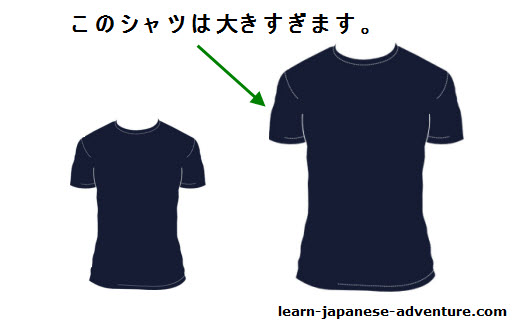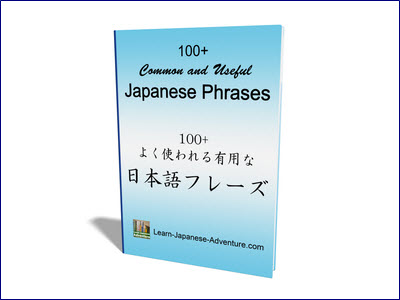- Home
- Intermediate Lessons
- すぎる sugiru Too Much in Japanese
すぎる sugiru Too Much in Japanese -
Intermediate Lessons: 29
In Japanese, we often use すぎる sugiru or すぎます sugimasu to indicate that the degree of an action or a state is excessive.

In this lesson, you'll get to learn how to use this Japanese grammar to show that something (action or state) is too much.
It's often not so good to overdo something. Therefore, すぎる sugiru is usually used in reference to undesirable states.
Sentence Patterns
Let's look at the sentence patterns of this grammar...
| Verb (Stem of ます-form) | すぎます |
| い-Adj (~ |
すぎます |
| な-Adj | すぎます |
Exception: いい → よすぎます、 ない → なさすぎます
Note that after converting to すぎる sugiru, the result becomes a Group 2 verb and therefore conjugates in the same way.
For example, 食べ過ぎる (tabesugiru)、食べ過ぎない (tabesuginai)、食べ過ぎた (tabesugita), etc.
Examples of すぎる sugiru using Verbs
|
1. |
田中さんはハンバーガーを十個食べたから、気持ちが悪いです。彼は食べ過ぎました。 |
|
2. |
山田さんはワインを5本飲んだから、もう立てません。彼は飲みすぎました。 |
|
3. |
鈴木さんはカラオケ屋で6時間歌を歌ったから、喉が痛いです。彼は歌いすぎました。 |
The above examples using すぎます sugimasu all deliver the speaker's negative feeling. But it really depends on the speaker's personal feeling. He or she will use すぎます sugimasu only if he or she has a negative feeling.
In Example 1, if you ate the same amount of hamburgers and you're feeling OK, you can say 沢山食べました (takusan tabemashita - ate a lot).
However, if you feel like vomiting or if you're feeling bad after eating, you're definitely eating too much. Then it's better to express your negative feeling using 食べ過ぎました (tabesugimashita).
In Example 2, if you drank the same amount of wine and you're feeling fine, you can say 沢山飲みました (takusan nomimashita - drank a lot).
However, if you cannot stand up anymore and somebody has to bring you home after drinking so many bottles of wine, you're drinking too much.
To express the negative feeling, you can say 飲みすぎました (nomisugimashita).
Similarly, in Example 3, if you sang for the same length of time and still felt alright, you can say 沢山歌いました (takusan utaimashita - sang a lot).
However, if you cannot speak and talk the next day after singing for so long, you're singing too much. Hence, to express the negative feeling, you should say 歌いすぎました (utaisugimashita).
Examples of すぎる sugiru using Adjectives
|
1. |
このズボンは長すぎます。 |
|
2. |
このシャツは大きすぎます。 |
|
3. |
この車は高すぎるから、買えません。 |
|
4. |
この本は複雑すぎるから、読めません。 |
|
5. |
このゲームは簡単すぎるから、面白くないです。 |
Similar to the examples using verbs, the above examples (using adjectives) also express the speaker's negative feeling.
For example, the pair of trousers is long but if you still can wear it, you just say このズボンは長いです (kono zubon wa nagai desu - this pair of trousers is long).
However, if it's too long that you cannot wear it unless you make some alteration, then you should say このズボンは長すぎます (kono zubon wa nagasugimasu) to express your negative feeling.
Noun for すぎる sugiru
You can convert すぎる sugiru to nouns but that's only for verbs.
| Verb (Stem of ます-form) すぎ | → | Noun |
Normally when you want to convert a Japanese verb into a noun, you add こと (koto) after the dictionary-form. For example...
- たばこを吸いすぎること
tabako wo suisugiru koto
But with the above sentence pattern, you can say...
- たばこの吸いすぎ
tabako no suisugi
Examples for Noun using すぎ sugi
|
1. |
たばこの吸いすぎは体によくありません。 |
|
2. |
お酒の飲みすぎは体によくありません。 |
|
3. |
運動のしすぎは体によくありません。 |
Conclusion
It really depends on the speaker's personal feeling to use すぎる sugiru.
If there're 2 persons A さん and B さん. A さん is poor and B さん is very rich. Suppose both of them have $500 in their wallet today.
For A さん, he will probably say 今日はお金を沢山持っています。 (kyou wa okane wo takusan motte imasu - I have plenty of money today).
However, for B さん, he usually carries more than $5000 in his wallet. So $500 to him is too little.
Therefore B さん will probably say 今日はお金がなさすぎます。 (kyou wa okane ga nasasugimasu - I have too little money today).
Best Deal of the Year! Get 68% OFF Lifetime Premium! Ends on 13 Dec 2025
Click Here to Get 68% OFF Lifetime Premium and be on the fast track to fluency in Japanese.
The link above is an affiliate link, which means that I would earn a commission (at no extra cost to you) if you do end up purchasing the related learning course.
Previous - Lesson 28: たら tara Sentence Special Case
Buy me a coffee









Facebook Comments
Don’t see the comments box? Log in to your Facebook account, give Facebook consent, then return to this page and refresh it.